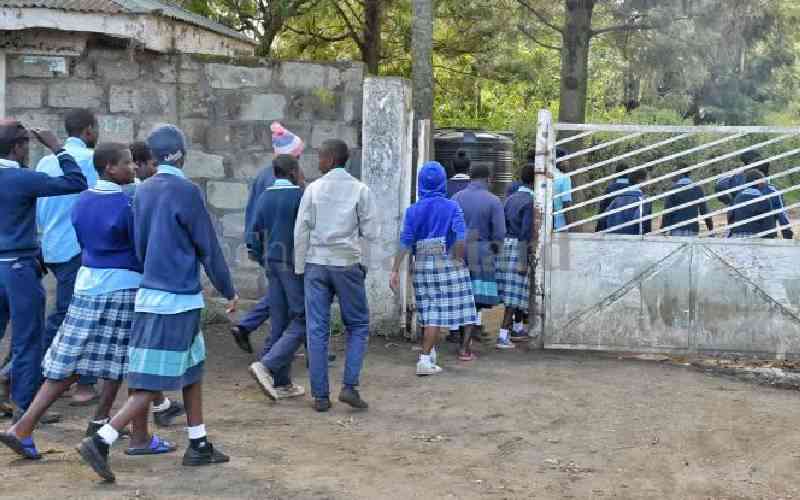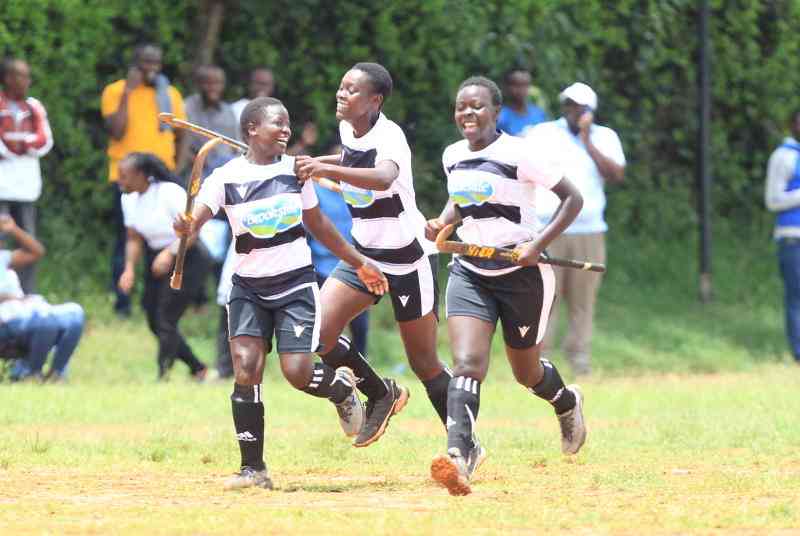 |
|
Peter Kamau |
By Antony Gitonga
Naivasha, Kenya: Around the high wall that is Naivasha GK prison stands hawked-eye warders armed with guns and binoculars.
Beyond the dark and intimidating wooden gate, hundreds of inmates in stripped shorts and shirts clean up as warders watch over them.
But in one of the halls inside the prison grounds, more than 1,400 inmates sit in more than 10 groups, each listening keenly to men in front of them.
To a first-timer, the competing voices of men speaking to eager inmates with torn exercise books resting on their laps, is confusing. The men in front of them are apparently teachers, some dressed as warders and others inmates.
This is the Naivasha prison ‘education complex’, complete with all classes from Standard One to college.
Frustration, fear
Since there are no partitions in the hall, it is only from the voices of teachers that one can tell the primary, secondary and the vocational courses sections.
However, at one corner of the hall, there is a lone figure dressed in a blue shirt and a matching trouser. The light-skinned man, unlike his fellow inmates, has a laptop and a heap of books in front of him.
This man has special status in this education centre – he is a university student. Peter Kamau Ndung’u is the man who has made history in Kenya, as the first university student in a prison.
The 35-year-old, who now marks 14 years since he was sentenced to hang, is currently studying for his Bachelor of Commerce degree at the ‘prison’s university’ through a distance learning programme.
“I was jailed 14 years ago for a crime I did not commit, but I resolved not to allow frustration, fear and desperation to blur my vision,” he told The Nairobian.
Kamau made history in prison three years ago after he passed the last, and highest stage of accounts – CPA part III section (VI) in a record three years, while behind bars and without a single referral.
Darkest moment of my life
The son of a pastor and the fourth born in a family of ten is serving a life sentence for violent robbery, a charge he still denies.
Stay informed. Subscribe to our newsletter
He finished his secondary school in Karigu-ini Secondary School in Murang’a in 1996 and scored C+.
Four years later, he was sentenced to life in prison by the High Court in Nyeri for a robbery in his Murang’a home in 1999.
“This was the darkest moment of my life and to make matters worse, I was transferred to the execution block in Kamiti Maximum Prison to wait for a date with the executioner,” Kamau, who was 21 at the time, says.
Incarcerated and alone, he discovered that he had the most valuable resource on earth – time!
When he was later transferred to Naivasha GK prison, between 2001 and 2004, he sat for various single and group courses, and later took Kenya National Examination Council exams, which he passed.
Saved from the hangman’s
In December 2004, he sat the Kenya Accounting Technicians Certificate (KATC) intermediate exams, and a year later passed the KATC final exams.
But it was not as smooth for him. He lost his appeal, and the State decided he should be sent to the gallows.
In the meantime, Kamau put all his efforts in becoming a qualified accountant. Between 2006 and 2009, he studied and passed all CPA (Certified Public Accountant) exams before graduating in Strathmore.
“I got a scholarship from Strathmore University to continue with my studies, but I could not make it given I was behind bars,” says Kamau.
In 2009, Kamau was saved from the hangman’s noose when former President Kibaki commuted the sentences of all death row inmates – more than 4,000 at the time – to life in prison.
All that time, and even now, he did not have a teacher and had to read outdated books. Occasionally he would search for own references from the Internet while in his Naivasha prison cell.
The convict had other interests apart from his first love, accounting. In 2010, he embarked on studying counselling, where he enrolled for a diploma. He passed the exams with distinction, before applying for the distance learning programme at the University of Nairobi. With the help of prison authorities, he received an admission letter to study a Bachelor of Commerce degree. He sought help to pay school fees, and as luck would have it, a Nakuru preacher John Kimani William, came to his aid in 2012.
“I am usually taken to Nairobi to sit exams, and I have since developed good relationship with my classmates and teachers,” he says.
Apparently, the third year student only meets his ‘classmates’ during exam time at the University of Nairobi, as the law requires that he be guarded and remain within prison precincts most times.
He did not attend burial
Due to commitment and dedication, Kamau has his own cell, and is the only inmate allowed to have a laptop and access to Internet in the prison.
“Just like other inmates, we have challenges like, lack of learning materials and teachers, but I thank the officer in charge and the Prisons Department for all that they have done for me,” he says.
He says life behind bars has not been easy. He did not attend the burial of his two brothers and sometimes blames himself for their deaths.
Recently, prison warders, inmates and friends held a funds drive to clear Kamau’s university fees where more than Sh400,000 was raised in a record two hours. Patrick Mwenda, the officer in charge of the prison, is full of praise for the inmate.
“Kamau has been in prison for over 14 years, and his desire to seek education leaves many in shock, and so we are doing the best to help him,” he says.
Mwenda is hopeful that the recently created Power of Mercy Commission will consider him for pardon.
The constitutional agency advises the president on inmates to be freed.
“It’s a psychological torture to inmates serving death and life sentence, as they are unsure of the future. Kamau has, however, put aside his bitterness. He is one of a kind,” says Mwenda.
The number of inmates who have joined the prison education programme have risen from 200 five years ago to 1,400.
 The Standard Group Plc is a
multi-media organization with investments in media platforms spanning newspaper
print operations, television, radio broadcasting, digital and online services. The
Standard Group is recognized as a leading multi-media house in Kenya with a key
influence in matters of national and international interest.
The Standard Group Plc is a
multi-media organization with investments in media platforms spanning newspaper
print operations, television, radio broadcasting, digital and online services. The
Standard Group is recognized as a leading multi-media house in Kenya with a key
influence in matters of national and international interest.
 The Standard Group Plc is a
multi-media organization with investments in media platforms spanning newspaper
print operations, television, radio broadcasting, digital and online services. The
Standard Group is recognized as a leading multi-media house in Kenya with a key
influence in matters of national and international interest.
The Standard Group Plc is a
multi-media organization with investments in media platforms spanning newspaper
print operations, television, radio broadcasting, digital and online services. The
Standard Group is recognized as a leading multi-media house in Kenya with a key
influence in matters of national and international interest.









